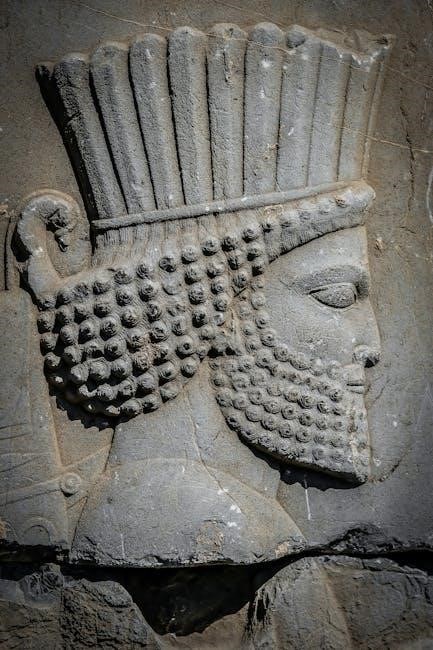apostle paul timeline pdf

This timeline explores the life and ministry of Apostle Paul‚ from his birth in Tarsus to his martyrdom in Rome‚ highlighting key events and their significance.
Overview of Paul’s Life and Ministry
Apostle Paul‚ born in Tarsus‚ was a Roman citizen and Pharisee who persecuted Christians before his conversion on the Damascus road. He became a pivotal figure in early Christianity‚ undertaking three missionary journeys to spread the Gospel across the Roman Empire. Paul founded churches‚ wrote epistles‚ and endured imprisonment for his faith. His teachings on grace‚ faith‚ and the inclusion of Gentiles in God’s plan reshaped Christianity‚ leaving a lasting legacy in the Church and biblical theology.
Importance of Understanding Paul’s Timeline
Understanding Apostle Paul’s timeline clarifies his missionary journeys‚ epistles‚ and theological contributions‚ providing insight into his role in early Christianity. His life‚ spanning key historical events‚ influences Christian doctrine and practice. Studying his chronology connects his teachings to specific contexts‚ enhancing biblical interpretation. This timeline is essential for grasping the development of the early Church and the spread of Christianity‚ making Paul’s legacy relevant for modern faith and discipleship.
Key Sources for Paul’s Chronology
The primary source for Paul’s timeline is the Book of Acts‚ detailing his conversion‚ missionary journeys‚ and imprisonment. His epistles‚ such as 1 and 2 Thessalonians‚ Corinthians‚ and Romans‚ provide additional insights into his ministry and writings. Scholarly resources‚ including biblical handbooks and historical documents‚ help reconstruct his life. These sources‚ combined with archaeological data‚ offer a comprehensive understanding of Paul’s chronology‚ though some dates remain debated among scholars.

Early Life of Apostle Paul
Paul was born in Tarsus‚ a Roman citizen‚ and educated under Gamaliel in Jerusalem. He initially persecuted Christians as a zealous Pharisee before his conversion.
Birth in Tarsus and Roman Citizenship
Apostle Paul was born in Tarsus‚ a city in Cilicia‚ around 5 AD. His Roman citizenship‚ granted at birth‚ provided privileges that later aided his ministry. This status allowed him to appeal to Roman authorities and travel freely throughout the empire. Tarsus‚ a cultural hub‚ likely influenced Paul’s early education and worldview‚ shaping his future missionary endeavors and theological insights.
Education in Jerusalem Under Gamaliel
Paul studied under Gamaliel‚ a renowned Pharisee and scholar‚ in Jerusalem. This education immersed him in Jewish law and scripture‚ shaping his identity as a Pharisee. Gamaliel’s teachings emphasized strict adherence to tradition‚ influencing Paul’s early persecution of Christians. His training laid the foundation for his later theological arguments and missionary work‚ blending Jewish tradition with Christian doctrine.
Paul as a Pharisee and Persecutor of Christians
Before his conversion‚ Paul‚ then known as Saul‚ was a zealous Pharisee. He actively persecuted early Christians‚ viewing them as a threat to Jewish traditions. His involvement in the martyrdom of Stephen and the imprisonment of believers highlight his dedication to suppressing the faith. This period of persecution contrasts sharply with his later role as a Christian apostle‚ underscoring his dramatic transformation after encountering Christ.

Conversion and Early Ministry
Paul’s dramatic conversion on the Damascus road (33-34 AD) transformed him from a persecutor to a preacher of Christianity‚ marking the start of his missionary work.
Conversion on the Road to Damascus (33-34 AD)
Paul’s conversion occurred on the Damascus road when he encountered a blinding light and heard Jesus’ voice‚ transforming him from a Christian persecutor to a devoted follower. This pivotal event‚ detailed in Acts‚ marked the beginning of his missionary work. The experience left him temporarily blind‚ leading to his baptism by Ananias. This divine encounter reshaped his purpose‚ setting the stage for his extensive ministry and the spread of Christianity across the Roman Empire.
Initial Preaching and Escape from Damascus
After his conversion‚ Paul began preaching in Damascus‚ astonishing Jews by proclaiming Jesus as the Messiah. Facing a plot to kill him‚ he escaped by being lowered in a basket through the city wall‚ fleeing to Arabia. This period marked the start of his missionary efforts‚ as he spread the Gospel despite persecution‚ demonstrating his unwavering commitment to his newfound faith and setting the stage for his future ministries.
Ministry in Arabia and Return to Damascus
After escaping Damascus‚ Paul ministered in Arabia‚ likely engaging in missionary work and spiritual reflection. He later returned to Damascus‚ continuing to preach about Jesus‚ which stirred opposition. This period strengthened his resolve and deepened his understanding of the Gospel. His activities in Arabia and Damascus laid the foundation for his future missionary journeys‚ solidifying his role as a prominent figure in spreading Christianity beyond Jerusalem.
First Missionary Journey (45-47 AD)
Paul and Barnabas preached in Cyprus‚ Galatia‚ and Asia Minor‚ establishing churches and spreading the Gospel to Gentiles‚ marking the beginning of Paul’s missionary endeavors.
Places Visited: Cyprus‚ Galatia‚ and Asia Minor
Paul and Barnabas began their journey in Cyprus‚ preaching in cities like Salamis and Paphos. They then traveled to Galatia‚ visiting Antioch‚ Iconium‚ and Lystra‚ where they faced persecution but established thriving churches. In Asia Minor‚ they spread the Gospel to Gentiles‚ laying the foundation for early Christian communities. These regions were pivotal in Paul’s missionary work‚ marking the first major spread of Christianity beyond Jerusalem.
Key Events: Preaching to Gentiles and Church Planting
Paul’s ministry focused on preaching to Gentiles‚ breaking cultural and religious barriers. He and Barnabas established churches in cities like Antioch and Iconium‚ despite facing persecution. A notable event was the healing of a lame man in Lystra‚ which drew crowds but also led to opposition. This journey marked the beginning of Gentile-focused ministry‚ emphasizing salvation through faith in Jesus. Their efforts laid the groundwork for the early Christian church‚ demonstrating the universality of the Gospel message.
Return to Antioch and Report to the Church
After completing their missionary journey‚ Paul and Barnabas returned to Antioch‚ where they shared stories of their experiences. They reported the successes of their ministry‚ including the establishment of churches among Gentiles. Despite facing persecution‚ they emphasized God’s grace and the growth of the faith. This report strengthened the church in Antioch and encouraged believers‚ showcasing the universality of the Gospel. Their testimony laid the foundation for future missionary efforts and solidified Antioch as a hub for Christian outreach.

Second Missionary Journey (49-52 AD)
Paul‚ accompanied by Silas‚ traveled through Asia Minor‚ Macedonia‚ and Greece‚ preaching the Gospel. Key events included ministry in Philippi‚ Thessalonica‚ and Corinth‚ with 1st and 2nd Thessalonians written during this period.
Places Visited: Asia Minor‚ Macedonia‚ and Greece
During his second journey‚ Paul traveled through Asia Minor‚ preaching in cities like Derbe and Lystra. He then moved to Macedonia‚ visiting Philippi‚ Thessalonica‚ and Berea. In Greece‚ he ministered in Athens and Corinth‚ spreading the Gospel. This journey marked the first time the Gospel reached Europe‚ following a vision in Troas. Paul’s travels laid the foundation for churches in these regions‚ significantly expanding Christianity’s reach.
Key Events: Ministry in Philippi‚ Thessalonica‚ and Corinth
In Philippi‚ Paul and Silas were imprisoned but sang hymns‚ leading to the conversion of the jailer and his family. In Thessalonica‚ they faced opposition but established a thriving church. In Corinth‚ Paul ministered for 18 months‚ writing 1 and 2 Corinthians. These cities became pivotal centers for early Christianity‚ showcasing Paul’s resilience and dedication to spreading the Gospel despite persecution and challenges.
Writing of 1st and 2nd Thessalonians
During his second missionary journey‚ Paul wrote 1st and 2nd Thessalonians (circa 49-52 AD) from Corinth. These epistles addressed concerns about the Second Coming‚ encouraged believers to live holy lives‚ and provided teachings on faith‚ love‚ and perseverance. They are among Paul’s earliest writings‚ offering insights into the challenges faced by the Thessalonian church and serving as foundational texts for Christian theology and eschatology.

Third Missionary Journey (53-58 AD)
Paul traveled through Galatia‚ Phrygia‚ and Ephesus‚ spending significant time in Ephesus. He wrote Corinthians‚ Galatians‚ and Romans‚ strengthening churches and spreading the Gospel.
Places Visited: Galatia‚ Phrygia‚ and Ephesus
During his third journey‚ Paul revisited Galatia and Phrygia‚ strengthening existing churches. He spent extensive time in Ephesus‚ a key hub for ministry‚ where he taught and mentored believers. This period was crucial for consolidating his teachings and expanding the church’s influence in Asia Minor. Ephesus became a central location for his missionary efforts‚ facilitating the spread of Christianity across the region.
Key Events: Ministry in Ephesus and Other Cities
During his third missionary journey‚ Paul spent approximately two years and three months in Ephesus‚ where he taught‚ mentored‚ and established a strong church. His ministry there included public preaching‚ miracles‚ and spiritual warfare. Ephesus became a hub for spreading Christianity across Asia Minor. Paul also visited other cities‚ strengthening churches and addressing theological issues. His work in Ephesus and surrounding areas solidified his legacy as a pivotal figure in early Christianity‚ leaving a lasting impact on the region.
Writing of Corinthians‚ Galatians‚ and Romans
During his third missionary journey‚ Paul wrote several influential epistles. To the Corinthians‚ he addressed church unity‚ spiritual gifts‚ and resurrection. Galatians emphasized salvation by grace over works. Romans‚ a theological masterpiece‚ outlined God’s plan of redemption; These letters‚ written during his ministry in Ephesus and beyond‚ provided doctrinal clarity and guidance to early churches‚ shaping Christian theology and practice. They remain foundational for understanding Paul’s teachings and the essence of the Gospel.
Imprisonment and Later Ministry
Paul was arrested in Jerusalem‚ imprisoned in Caesarea‚ and later appealed to Caesar‚ leading to his voyage to Rome. Under house arrest‚ he continued ministering‚ impacting many despite captivity.
Arrest in Jerusalem and Imprisonment in Caesarea (58-60 AD)
Paul was arrested in Jerusalem after a riot broke out in the temple‚ sparked by his ministry to Gentiles. He was detained in Caesarea for two years under Governors Felix and Festus. Despite trials and plots against him‚ Paul continued to preach the Gospel‚ even to his captors. This period marked a significant shift in his ministry‚ as he transitioned from missionary journeys to a more confined yet impactful witness.
Appeal to Caesar and Voyage to Rome (60-61 AD)
Paul‚ facing trial in Caesarea‚ appealed to Emperor Nero‚ exercising his Roman citizenship; He was sent to Rome under Roman custody. The voyage was perilous‚ with a shipwreck on Malta‚ where Paul miraculously survived. After three months‚ he reached Rome‚ where he lived under house arrest for two years‚ preaching the Gospel to visitors‚ including Jewish leaders and others. This period marked the end of his missionary journeys but not his ministry.
House Arrest in Rome and Ministry There (61-63 AD)
During his two-year house arrest in Rome‚ Paul continued his ministry‚ preaching to visitors and writing epistles. He authored Ephesians‚ Philippians‚ Colossians‚ and Philemon‚ addressing theological and practical issues. Despite confinement‚ his influence grew‚ and he remained a pivotal figure in spreading Christianity. This period showcased his resilience and dedication to the Gospel‚ even in challenging circumstances.

Epistles Written by Apostle Paul
Paul wrote Thessalonians‚ Corinthians‚ Galatians‚ Romans‚ Ephesians‚ Philippians‚ Colossians‚ and Philemon‚ guiding early churches and explaining theological truths. His pastoral epistles include 1st and 2nd Timothy‚ Titus‚ and possibly Hebrews‚ though authorship of the latter is debated.
Thessalonians‚ Corinthians‚ Galatians‚ and Romans
Paul wrote 1st and 2nd Thessalonians (circa 50 AD) to address the Second Coming and persecutions. Corinthians (56 AD) focused on church unity and doctrinal issues. Galatians (55 AD) emphasized salvation by faith over works. Romans (57 AD)‚ a theological masterpiece‚ outlined God’s plan of redemption. These epistles‚ written during his missionary journeys‚ provided spiritual guidance and theological depth to early Christian communities‚ shaping Christian doctrine and practice.
Ephesians‚ Philippians‚ Colossians‚ and Philemon
Written during Paul’s imprisonment in Rome (61-63 AD)‚ these epistles address specific communities. Ephesians emphasizes the unity of the church as Christ’s body. Philippians‚ a letter of joy‚ thanks the church for their support. Colossians refutes heresy‚ affirming Christ’s supremacy. Philemon‚ a personal appeal‚ advocates for forgiveness and reconciliation. These letters‚ though varied in purpose‚ collectively deepen understanding of Christian identity‚ unity‚ and relationships‚ reflecting Paul’s pastoral concern and theological depth.
1st and 2nd Timothy‚ Titus‚ and Hebrews
These epistles‚ traditionally attributed to Paul‚ were written during his later ministry. 1st and 2nd Timothy and Titus‚ known as the Pastoral Epistles‚ focus on church leadership and doctrine. Hebrews‚ while debated in authorship‚ emphasizes Christ’s superiority and perseverance in faith. Written around 62-64 AD‚ these letters address practical concerns‚ theological depth‚ and encouragement for believers facing challenges‚ reflecting Paul’s concern for the maturing church and its leaders.

Death and Legacy of Apostle Paul
Apostle Paul was martyred in Rome around 64-65 AD‚ likely by beheading. His teachings and epistles profoundly shaped Christianity‚ leaving a lasting legacy in the church.
Martyrdom in Rome (64-65 AD)
Apostle Paul was martyred in Rome around 64-65 AD‚ during Emperor Nero’s persecution. He was beheaded outside the city‚ a method reserved for Roman citizens. His remains were buried near Rome‚ marking the end of his earthly ministry. Paul’s martyrdom solidified his legacy as a pivotal figure in Christianity‚ inspiring countless believers and shaping the early church’s doctrine and practices.
Impact of Paul’s Ministry on the Early Church
Apostle Paul’s ministry profoundly shaped the early church‚ establishing communities across the Roman Empire and unifying Jewish and Gentile believers. His teachings on grace‚ faith‚ and the inclusion of Gentiles revolutionized Christian doctrine. Paul’s epistles became foundational texts‚ guiding the church’s growth and theological understanding. His legacy continues to influence Christianity‚ emphasizing love‚ forgiveness‚ and the universal message of salvation through Jesus Christ.
Historical Significance of Paul’s Life and Teachings
Apostle Paul’s life and teachings hold immense historical significance‚ shaping Christianity’s spread and doctrine. His missionary journeys and epistles unified Jewish and Gentile believers‚ establishing a universal faith. Paul’s emphasis on grace and faith transformed Christian theology‚ influencing centuries of religious thought. His writings remain foundational‚ guiding the church’s growth and theological understanding. Paul’s legacy as a missionary‚ theologian‚ and martyr solidified his impact on global Christianity‚ making him one of history’s most influential figures.
Apostle Paul’s life and teachings profoundly shaped Christianity‚ leaving a lasting legacy through his missionary journeys‚ epistles‚ and unwavering faith‚ inspiring believers for centuries.
Apostle Paul‚ born in Tarsus‚ was a Roman citizen and Pharisee who persecuted Christians until his conversion on the Damascus road (33-34 AD). He embarked on three missionary journeys‚ establishing churches across the Roman Empire. Paul wrote epistles to these churches‚ addressing theological and practical issues. He was arrested in Jerusalem‚ imprisoned in Caesarea‚ and later taken to Rome‚ where he was martyred (64-65 AD). His teachings and legacy remain foundational to Christianity‚ shaping doctrine and practice for centuries.
Relevance of Paul’s Timeline for Modern Christianity
Apostle Paul’s timeline remains vital for modern Christianity‚ offering insights into the spread of the Gospel and the establishment of the early church; His missionary journeys and epistles address timeless theological and practical issues‚ shaping Christian doctrine and practice. Paul’s resilience amid persecution and his commitment to spreading God’s Word inspire believers today. His teachings on faith‚ grace‚ and community continue to guide Christian living‚ making his life and legacy enduringly relevant in contemporary times.





